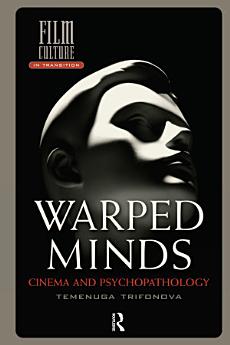Warped Minds: Cinema and Psychopathology
অক্টো ২০২৫ · Taylor & Francis
ইবুক
284
পৃষ্ঠা
family_home
যোগ্য
info
reportমূল্যাংকন আৰু পৰ্যালোচনা সত্যাপন কৰা হোৱা নাই অধিক জানক
এই ইবুকখনৰ বিষয়ে
Warped Minds explores the transformation of psychopathologies into cultural phenomena in the wake of the transition from an epistemological to an ontological approach to psychopathology. Trifonova considers several major points in this intellectual history: the development of a dynamic model of the self at the fin de siècle, the role of photography and film in the construction of psychopathology, the influence of psychoanalysis on the transition from static, universalizing psychiatric paradigms to dynamic styles of psychiatry foregrounding the socially constructed nature of madness, and the decline of psychoanalysis and the aestheticization of madness into a trope describing the conditions of knowledge in postmodernity as evidenced by the transformation of multiple personality and paranoia into cultural and aesthetic phenomena.
লিখকৰ বিষয়ে
Temenuga Trifonova is Associate Professor in Creative Arts and Humanities at University College London. She is the author of Screening the Art World, The Figure of the Migrant in Contemporary European Cinema, Contemporary Visual Culture and the Sublime, Warped Minds: Cinema and Psychopathology, European Film Theory, The Image in French Philosophy, and the novels Tourist and Rewrite.
এই ইবুকখনক মূল্যাংকন কৰক
আমাক আপোনাৰ মতামত জনাওক।
পঢ়াৰ নির্দেশাৱলী
স্মাৰ্টফ’ন আৰু টেবলেট
Android আৰু iPad/iPhoneৰ বাবে Google Play Books এপটো ইনষ্টল কৰক। ই স্বয়ংক্রিয়ভাৱে আপোনাৰ একাউণ্টৰ সৈতে ছিংক হয় আৰু আপুনি য'তে নাথাকক ত'তেই কোনো অডিঅ'বুক অনলাইন বা অফলাইনত শুনিবলৈ সুবিধা দিয়ে।
লেপটপ আৰু কম্পিউটাৰ
আপুনি কম্পিউটাৰৰ ৱেব ব্রাউজাৰ ব্যৱহাৰ কৰি Google Playত কিনা অডিঅ'বুকসমূহ শুনিব পাৰে।
ই-ৰীডাৰ আৰু অন্য ডিভাইচ
Kobo eReadersৰ দৰে ই-চিয়াঁহীৰ ডিভাইচসমূহত পঢ়িবলৈ, আপুনি এটা ফাইল ডাউনল’ড কৰি সেইটো আপোনাৰ ডিভাইচলৈ স্থানান্তৰণ কৰিব লাগিব। সমৰ্থিত ই-ৰিডাৰলৈ ফাইলটো কেনেকৈ স্থানান্তৰ কৰিব জানিবলৈ সহায় কেন্দ্ৰত থকা সবিশেষ নিৰ্দেশাৱলী চাওক।






